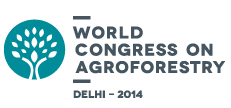Experiential learning practices in Nigerian’s tertiary agricultural education Institutions
Experiential learning practices in Nigerian’s tertiary agricultural education Institutions
wca2014-2499 Marie Louise T. Avana 1,*Aissetou D. Yaye 2Sebastian C. Chakeredza 2Paul K. Baiyeri 3 1Forestry, University of Dschang, Yaoundé, Cameroon, 2secretariat, ANAFE, Nairobi, Kenya, 3Agriculture, University of Nigeria NSuKKA, Enugu, NigeriaAgricultural education in African tertiary institutions have been found unable to develop skills and capacities for applying and analyzing useful knowledge adapted to their specific situations and to emerging issues. Experiential learning, known as a teaching process based on concrete experience, observations, generalization and conceptualization is well documented as the best teaching approach to develop skills and competencies for problem solving, decision making, critical thinking , professional and collaborative interactions. However the implementation of this learning practice in African education institutions is still very poorly assessed. A study was undertaken by ANAFE with as objectives to assess the experience of institutional actors, identify constraints and perspectives for expansion, and evaluate the current methods of integrating experiential learning in course contents. The study sampled 33 administrators, 65 lecturers, 52 students from 11 agricultural training institutions in Nigeria. The results showed that all institutions surveyed were practicing experiential learning for at least 10 years with 94% of lecturers being familiar with this teaching approach. At least 83% of students agreed that experiential learning had improved their ability to asses community needs and diagnose development challenges among others. Administrators identified 4 institutional benefits in practicing experiential learning, among which were visibility and performance, links with communities and partnerships. The most interesting experiential activities proposed by the administrators were: remunerated internships (75,75%), collaborative research projects (57,57%), community services and laboratory practical’s (51,51%) and projects with communities and private sectors (43%). It was also found that the number of courses, the proportion of the lecture tough in experiential form and the intensity of interactions with communities increased as far as the student progressed in his training programme. The study highlighted some opportunities and constraints and proposed recommendations both to institutions and to ANAFE for the expansion of experiential learning practices in Nigerian agricultural education systems.

